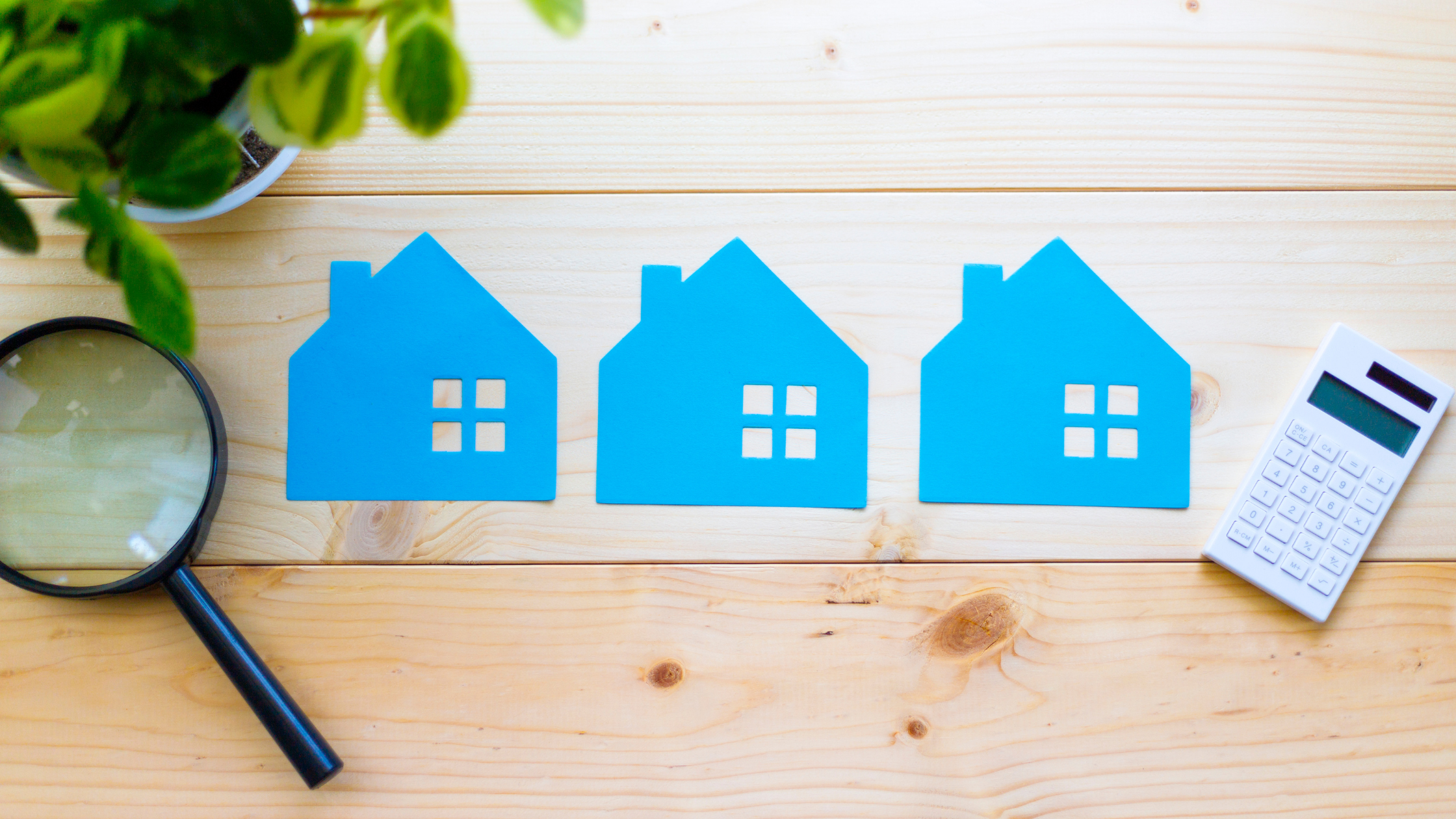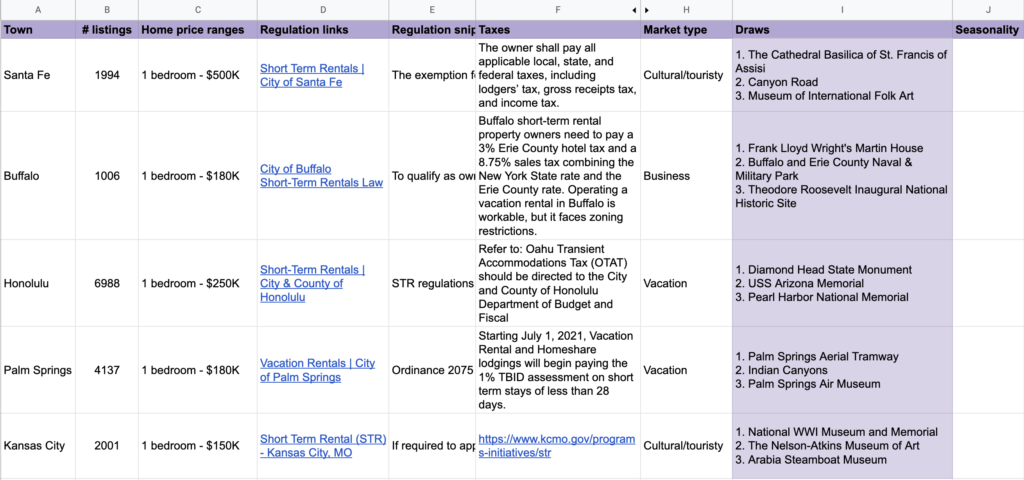I’m going to show you how to find an Airbnb for sale… the right way.
Here is our six step process, including steps I’ll bet you haven’t even thought of yet.
Gone are the days of buying anything on the MLS or from the Internet and expecting it to crush.
How do you know if your Airbnb is a good deal?
How do you know if your Airbnb will make money?
Is it in a good location?
Where do you find short term rentals for sale?
I’m going to tell you. Step-by-step.
If you’re a complete beginner and love the idea of a vacation home, but are a bit nervous about not losing your money, you’re in the right place.
Stick around.
This is the same process we’ve used with our own investments and our members to help them successfully invest in millions worth of real estate.
You’ll have the confidence to FIND and BUY your very own vacation home.
Let’s dive in.
Six Step Cycle To Find Great Airbnb Properties
Step 1: Decide where you want to invest FIRST
This part catches a lot of people off guard.
That might even be you right now, looking for properties all over.
Well, that’s backwards.
It’s fun to daydream at awesome listings in Maui or large cabins in Gatlinburg. But don’t.
Believe me: we WILL get to the point where we can look at properties. If you go fast, we can be there in just a few days!
The problem with looking at listings first? Properties can go quickly. If you don’t have the foundation set up, you’re left scrambling with an accepted offer, wondering if you made the right choice.
Or, and I’ll be brutally honest, you just never get past looking at listings. Scrolling listings is easy. Investing can be hard.
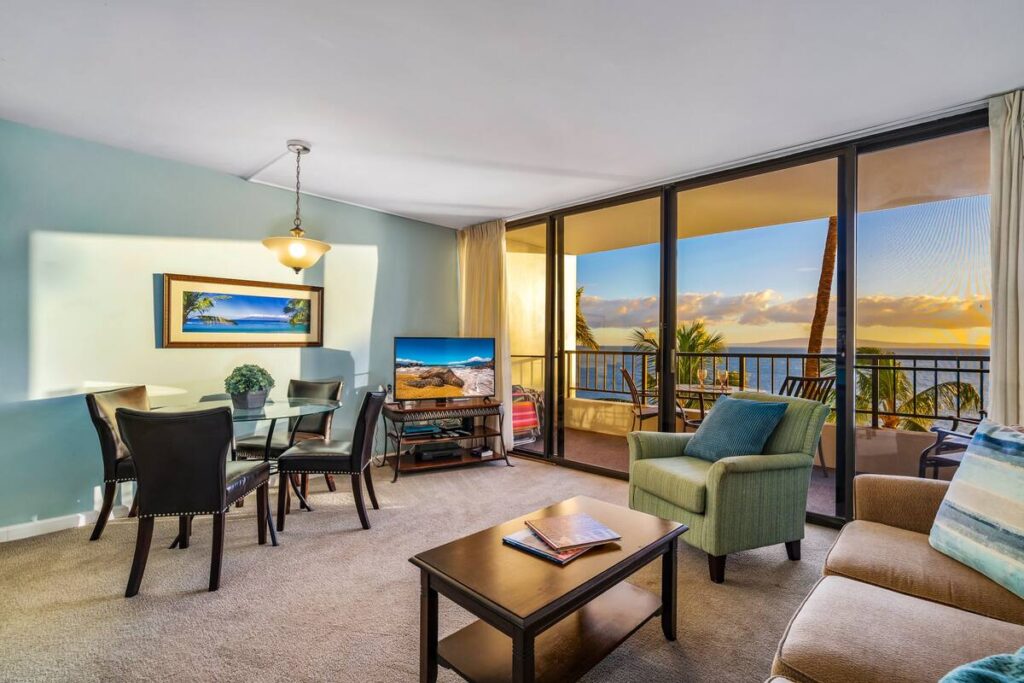
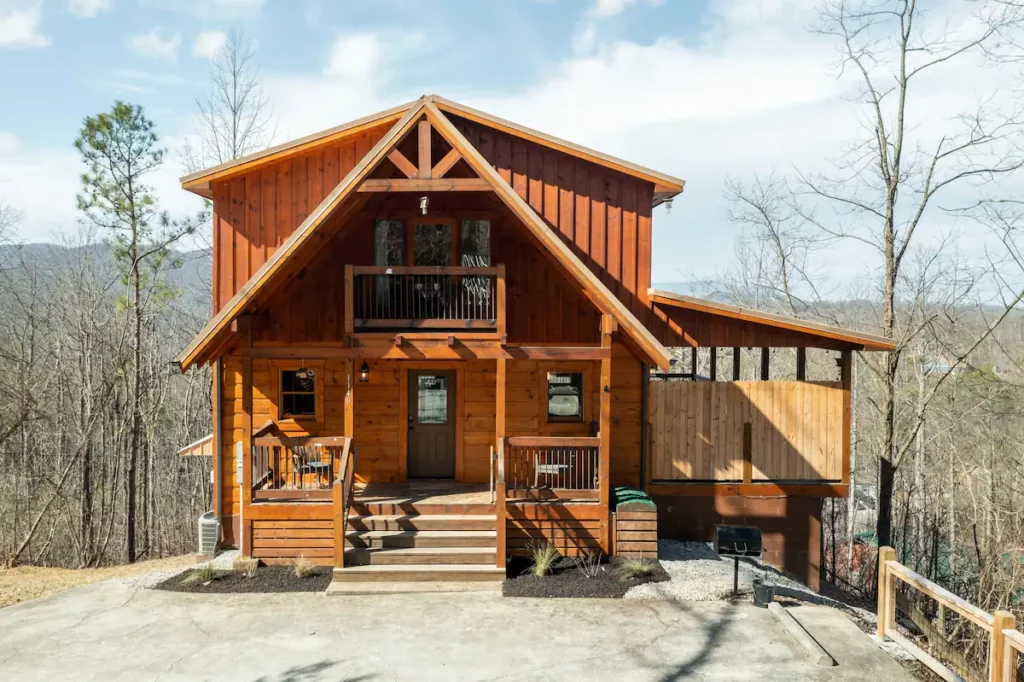
Step 2: Research where you want to invest
THIS is the money step. But so many just skip this step altogether.
Don’t do that.
We need to find markets that work well for Airbnb. And not every market is like this.
The biggest element of this? Finding the regulations of that area.
How do you do that?
Research your Airbnb market with these basic steps:
- Make sure your list of areas have both affordable inventory (prices that you can afford) and an existing Airbnb market (plenty of existing listings – Airbnb is not something you want to be a trailblazer on!).
- Find the exact regulations for the town, county, and/or province. Verify they’re favorable for Airbnb.
- Find the market “stats”
To dive in deeper to these steps (which I’ve expanded out), check out our Best Airbnb Markets blog then head back to this post to continue.
Step 3: Build up the right team
When you do this step depends on whether you want to buy on-market (with an agent) or off-market (directly from a seller).
But either way it needs done, especially if you picked a market where you can’t physically be there.
(Spoilers: This is most short term rental investors.)
For some who are interested in one property in a few different locations, this might mean you’re hunting down the best property manager.
A short term rental property manager often takes 20% of revenue off the top. They make your investment as passive as possible for you. However, not all of them handle taxes or permitting, but some do.
In general, they will handle any guest communications, pricing, marketing, and maintenance issues so you don’t have to.
That being said, you stand to save a lot of money by building your own “in-house” property management system.
In other words, there are many pros to finding one good market and purchasing a few different properties in that area.
You become an expert in the market, you can make purchasing decisions much quicker, you learn the people better, and you take advantage of the economies of scale.
That means it is much easier to plug in properties two, three, and so on into your existing system of people.
But you have to front-load the work, find the people, and build that system.
Key players on a short term rental management team:
- Cleaning team
- Maintenance person (who can handle 80% of all issues)
- Guest communications
- Portfolio Manager (once you have a few properties)
Step 4: Learn how to analyze properties
We’re getting closer! Here’s where we find our Airbnb for sale.
In this step, we need to just analyze. All the time. Our students will analyze 20, 30, or more properties before they get to one they buy.
And that’s because once you plug in the numbers that many times, you get comfortable with many pieces. You start to understand your market’s tendencies.
You’ll want to find out roughly how much utilities are in the area. Taxes. Insurance. Cleaning fees. Etc etc.
Now hold on.
You might be thinking: I can just trust my agent. They say they understand Airbnbs.
Don’t do that.
We’ve seen it too many times. Someone gets in WAY over their head because their agent “knows” a property will do $x but it hits nowhere close to that.
This is YOUR money. Finding the right data for how much a property earns is simple and doesn’t take a lot of time. Do not shortcut this.
Analysis is making sure what you earn is more than what you spend. Obviously.
But if you have the wrong revenue numbers, it can make or break your investment.
You could enter a bad investment when you shouldn’t’ve. You can pass on a great investment you should’ve bought.
So how do you get the right revenue numbers?
“Can’t I just use Airbnb’s website to find revenue numbers?”
No.
You should not use Airbnb itself to see what you can make on Airbnb for a few reasons.
- Anyone can put whatever price they want for their property. That doesn’t mean it gets book.
- You’re only seeing properties that haven’t been booked yet.
- Prices fluctuate so much across all the seasons, you can’t pick a random week and extrapolate and expect to find accurate numbers.
- If you’re looking for comps on a property, do you check the MLS or Zillow? Or would your agent look at properties sold? The market is what’s sold.
In our case, it’s what has already been booked.
For short term rentals, use something like AirDNA, STR Insights, or AllTheRooms to find past revenue data.
You can’t simply find the market and grab the average revenue (sometimes you see this on the top of the page, which they give out for free).
The average takes into account every property. If you’re buying a large one, you want to exclude the small ones, and vice versa.
Paying the small amount for one month of access to the data is a very small price to pay when we’re talking about hundreds of thousands towards an investment.
Then, you’ll have access to the full revenue numbers and filters.
For us, we advise making sure it cash flows at the 50th percentile numbers and hits about 15% cash-on-cash ROI at the 75th percentile numbers.
Something else to keep in mind is the result of the pandemic on revenues.
You’ll likely see a jump or decline in the 2020-2022 ranges. We’re seeing certain areas cooling off, so take that into account when you run a “worst case” analysis.
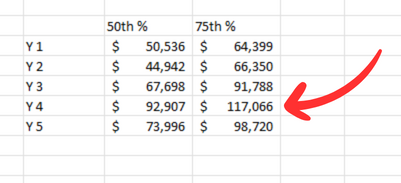
Step 5: Begin searching for properties
This is probably the step you want to be on anyway, and here’s your chance.
After we’ve made sure we’re looking in the right area AND that we know what we’re looking at, NOW we can start searching for properties.
There are two ways this can happen: “on” market and “off” market.
On market is when you use an agent. Off market is when two people agree to a sale of a property without the use of an agent. Sometimes you’ll see a “for sale by owner” sign for a house.
On market pros and cons:
- Much easier; you tell an agent what you’re looking for and they send you deals
- If you’re unsure what you’re looking for in a property, the agent helps guide you
- If you’re unsure of how to make sure the property is solid, the agent helps guide you
- You’re competing with others for the property and can get outbid
- Properties are (usually) in better or perfect condition
- You pay more by way of higher prices through competition and the agent’s fee
- Not many choices if there aren’t many homes for sale
Off market pros and cons:
- Much less (or no) competition for the properties
- Save lots of money with no agent
- Save lots of money if the property needs work
- Property likely needs work, which could get out of hand if you aren’t careful
- Harder to find these
- Have to figure out the process of closing yourself the first time
For newbies, or for anyone wanting just one property in an area, try talking to an agent first. Because you can analyze properties yourself correctly, you will be able to know if something is a good deal.
If you’re interested in multiple properties in the same area, consider setting up an off market system. Going to all that effort to save some money once might not be enticing, but if you do it across five properties, you stand to save up to six figures or more just on agent fees and market premiums.
After giving your parameters to your agent, you can also begin searching yourself. A big mistake people make is stretching their criteria when they fall in love with a property.
That’s what caused the Airbnbust.
Step 6: Put in offers
When something looks good to you, again, know your walk away point.
Not too long ago, properties were going for well over asking price with no contingencies. (Contingencies are a list of clauses that must be met or you can walk way. For example, if you require they leave the furniture or fix the roof first.)
Crazy.
But now, things seem to be cooling off a bit.
With your agent’s help (if you’re going on market), put in a conditional offer.
If you get into a bidding war, remember why you set your criteria.
Be strong enough to walk away when the property falls outside those criteria. There will always be another property that will come along.
Conclusion
Finding the right Airbnb for sale requires a well-planned and strategic approach – one that goes beyond just finding a place you like.
Use this roadmap, whether you’re a beginner or experienced investors, to determine the best location, research regulations and market stats, build a strong team, analyze properties, search for properties, and ultimately put in offers on the right property for your investment goals.
Yes, it may take time and effort. But having the right knowledge and tools will help you make smart, informed decisions on your way to building a lifestyle asset portfolio for yourself and for your legacy
–

